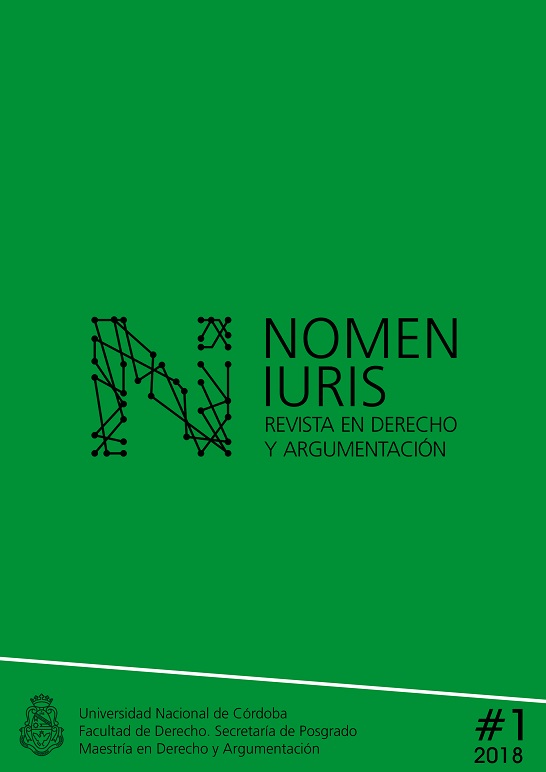Why the camping model? An alternative reading to Why not socialism? by G. A. Cohen
Keywords:
socialism, radical equality of opportunities, communityAbstract
Equality, as a social value, has been the subject of many political and legal constructions to develop an institutional design that becomes operational. One of these theories is G. A. Cohen’s proposal as an alternative to liberalism and all forms of market economic organization, represented in the socialist camping trip model. The synthesis of theoretical construction by Cohen will be explained in this paper, showing why the camping trip model would be both desirable and feasible (if certain conditions occur), due to the principles of radical equality of opportunity and community that sustains it. Furthermore, there will be presented two possible arguments, which reveal that not only the model of the camping would not be feasibledue a self-contradiction between the two principles that sustain it, but also it would not be entirely desirablefrom the point of view of intended generosity between equals. Finally another reason of disagreement about the desirability and feasibility of socialist organization on a higher scale will be mentioned.
References
Cohen, Gerald A., (2001). Si eres igualitarista, ¿cómo es que eres tan rico? Barcelona: Paidós.
Cohen, Gerald A., (2011). ¿Por qué no el socialismo?Buenos Aires: Katz.
Fatauros, Cristián, (2013). “Justicia y fraternidad social. ¿Qué ética individual exige la justicia socialista?”. Discusiones: Comunidad, perdón y justicia, 12 (1), 103-117.
Gargarella, Roberto(1999), Las teorías de la justicia después de Rawls. Barcelona: Paidós.
Guibourg, Ricardo, Echaave, Delia T., Urquijo, María E., (2008). Lógica, proposición y norma. Buenos Aires: Astrea.
Kymlicka, Will (1995). Filosofía política contemporánea. Una introducción. Barcelona: Ariel.
Lizárraga, Fernando (2011). “Rawls, la estructura básica y el comunismo”. Isegoría. Revista de Filosofía Moral y Política, Madrid, Consejo Superior de Investigaciones Científicas-Instituto de Filosofía, 44, 115-137.
Lizárraga, Fernando (2014).“Los límites del igualitarismo liberal de John Rawls”. Revista de la Facultad. Estudios Sociales, General Roca-RN, Publifadecs, 21, (19), 201-230.
Lizárraga, Fernando (2016). “Teoría política y diseño institucional. Principios e instituciones en las tradiciones liberal ysocialista, [diapositivas]”. Recuperado de http://aulavirtual.derecho.proed.unc.edu.ar/pluginfile.php/61949/mod_resource/content/1/Diapositiva s.pdf.
Moreso, Juan José (2006). La constitucionalización del Principio de Diferencia, Rawls post Rawls.Buenos Aires, Universidad Nacional del Quilmes: Prometeo.
Nino, Carlos (2007). Las concepciones fundamentales del liberalismo,Derecho moral y política. Fundamentos del liberalismo político. Barcelona: Gedisa.
Rawls, John 2000 [1971]). Teoría de la Justicia. México: Fondo de Cultura Económica.
Rawls, John (2004). La justicia como equidad. Una reformulación. Buenos Aires: Paidós.
Weston, Anthony (2006). Las claves de la argumentación. Barcelona: Ariel.
Downloads
Published
Issue
Section
License
Aquellos autores/as que tengan publicaciones con esta revista, aceptan los términos siguientes:- Los autores/as conservarán sus derechos de autor y garantizarán a la revista el derecho de primera publicación de su obra, el cuál estará simultáneamente sujeto a la Licencia Creative Commons que permite a terceros compartir la obra siempre que se indique su autor y su primera publicación esta revista.
- Los autores/as podrán adoptar otros acuerdos de licencia no exclusiva de distribución de la versión de la obra publicada (p. ej.: depositarla en un archivo telemático institucional o publicarla en un volumen monográfico) siempre que se indique la publicación inicial en esta revista.


